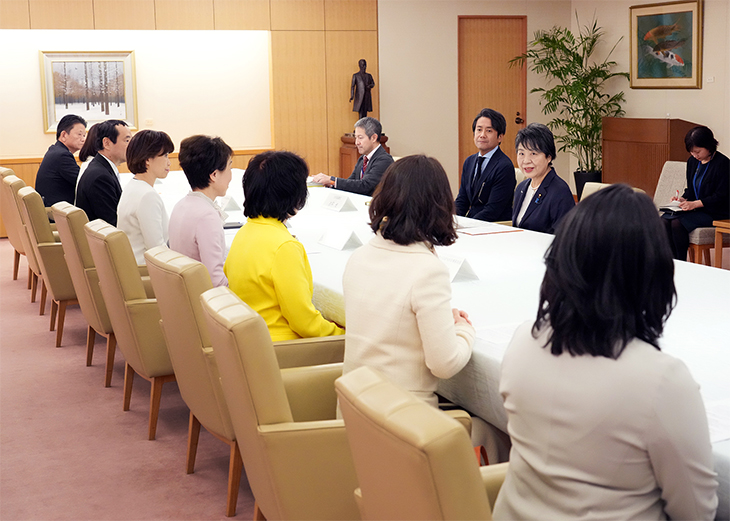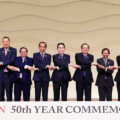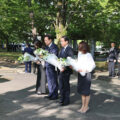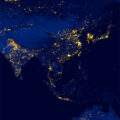The Need for “Feminist Diplomacy” in a Divided World — Expectations for Foreign Minister Kamikawa Yoko

On February 16, 2024, Foreign Minister Kamikawa Yoko received a proposal on the Taskforce on Women, Peace and Security (WPS) from Diet Members (photo). At the launch meeting of the Taskforce on WPS on January 29, 2024, Foreign Minister Kamikawa expressed her desire to “utilize a WPS perspective in an all-Japan manner” in cooperation with other ministries and agencies.
Photo: Ministry of Foreign Affairs
Mimaki Seiko, Associate Professor, Doshisha University
Japan may soon see its first “feminist foreign minister.” There is such hope in Kamikawa Yoko, who assumed the position of Foreign Minister in September 2023.
Since her appointment, Foreign Minister Kamikawa has offered a female perspective to conflict prevention and peacebuilding, and has enthusiastically promoted the “Women, Peace and Security (WPS)” initiative, which aims for more sustainable peace. A task force within the Ministry of Foreign Affairs was launched at the end of January. This task force is comprised of regional bureaus that handle bilateral relations with other countries, the International Cooperation Bureau, which handles Official Development Assistance (ODA), and more. At the task force launch meeting, Foreign Minister Kamikawa expressed her desire to “utilize a WPS perspective in an all-Japan manner” in cooperation with other ministries and agencies. She also spoke of her eagerness to incorporate Japan’s unique perspectives, “not only in promoting female participation but also in ‘Human Security’ and other human-centered diplomacy that Japan advances.”
The idea of the WPS stems from the United Nations Security Council Resolution 1325 on women, peace and security, which was adopted unanimously by the United Nations Security Council on October 31, 2000. This resolution was the first time the Security Council specifically addressed the distinctive and disproportionately significant impact of war on women, and it emphasized women’s contributions to all stages of conflict resolution and prevention, peacebuilding, peacemaking, and peacekeeping activities.[1]
In the 2010s, there was a further increase in the number of countries adopting a “feminist diplomacy” policy, placing the WPS at the center of their foreign policy. After Sweden’s former foreign minister Margot Wallström put forward the idea of “feminist diplomacy” in 2014, this idea has been incorporated into the foreign policy of many Western and Latin American countries, such as Canada, France, Germany, Luxembourg, Spain, Mexico, Argentina, and Chile. Foreign Minister Kamikawa is the first female foreign minister in 19 years and the third overall after Tanaka Makiko and Kawaguchi Yoriko. Japan may now finally be joining ranks with other countries with “feminist diplomacy.”
It is now finally becoming important for Japan, an Asian country, to develop its foreign policy from a feminist perspective, as the non-Western world fundamentally questions the idea of “feminist diplomacy” promoted by the West.
On October 7, 2023, Hamas, an Islamic organization based in Gaza, engaged in a cross-border attack, killing 1,200 Israeli citizens. The Netanyahu administration in Israel responded by launching a large-scale military operation across all of Gaza as “self-defense.” As of late February 2024, close to 30,000 Gaza citizens have been killed, and of those, 70% have been women and children. The humanitarian crisis is also increasing in severity. In late January 2024, multiple countries suspended their funding of the United Nations Relief and Works Agency for Palestine Refugees in the Near East (UNRWA), which provides humanitarian aid to Palestinians, after allegations surfaced that some UNRWA staff members had aided in the Hamas attack on Israel on October 7. After disciplining the concerned staff members and launching an independent inquiry commission to conduct a thorough investigation, the UN is asking countries to resume their suspended financial contributions from a humanitarian perspective.
Japan, along with the United States and Germany, has suspended its financial contributions to the UNRWA. Based on the fact that “many UNRWA staff members have been dedicated to providing humanitarian assistance to Gaza,” Japan made the painful decision to suspend additional funding to UNRWA “for the time being while UNRWA conducts an investigation into the matter.”[2] Palestinians, who have long trusted Japan’s humanitarian aid, are said to be particularly disappointed.[3] Dr. Seita Akihiro, Director of the Health Department at UNRWA, has publicly expressed a sense of crisis, stating that the suspension of financial contributions to the UNRWA “will be a death sentence to the people of Gaza” in light of the severe humanitarian crisis in Gaza at the moment. He called on Japan and other countries to resume funding.
Japan has a long history of involvement with the UNRWA. The UNRWA is a UN organization established by the United Nations General Assembly in 1949 to support and protect Palestinian refugees. The UNRWA has offered support to around 5 million Palestinian refugees in Gaza and the West Bank of the Jordan River, as well as in Jordan, Lebanon, and Syria. Japan first decided to send financial contributions to the UNRWA in 1953. At the time, Japan aspired to become a UN member state as a first step towards returning to the international community. It offered goods and funds for UNICEF, technical assistance for economic development for developing countries, and other UN-related projects with limited national resources. Financial contributions to the UNRWA were part of this. Japan became a UN member state on December 18, 1956.[4]
A thorough investigation into the UNRWA allegations is necessary for Israel’s security. However, the execution of the War on Terror must not tread on the lives of Palestinian citizens. With the humanitarian crisis in Gaza, Foreign Minister Kamikawa has drawn a line while acting in concert with Western countries through the G7 Foreign Ministers’ Meeting and more. In late January, she expressed her views when the International Court of Justice ordered Israel to prevent genocide in Gaza by any means necessary and to allow humanitarian aid quickly. [The order of provisional measures of the ICJ is] “legally binding on the parties to the dispute, and to be observed in good faith.” She also reiterated that as a country that “attaches great importance to the rule of law in the international community,” “Japan also has unequivocally condemned the terror attacks by Hamas and others, urged the immediate release of the hostages, and has urged Israel to comply with international law, including international humanitarian law, in exercising its right to defend itself and its people.”[5] She also visited the ICJ in The Hague during a visit to the Netherlands in early January 2024 and stressed that “One of the goals that Japan and I myself as a politician have cherished the most is to promote the “‘rule of law’ in the international community for the pursuit of peace and realize a safe and secure world where the ‘human dignity’ of each and every one of us is protected, as the world is becoming more divided and confrontational.” She also expressed Japan’s strong desire to contribute to the ICJ’s initiatives to strengthen the rule of law in the international community.[6]
Why are Western feminists silent when it comes to the issue of Gaza? There is, at last, a growing skepticism and criticism of the Western focus of “feminist diplomacy” in the Middle East and the Global South. Feminist diplomacy should be a universal concept, incorporating the perspectives of even the most vulnerable in the non-Western world. This is where Japan’s foreign policy has a role to play as the bridge between the G7 and the Global South as the only G7 country in Asia. Foreign Minister Kamikawa has come to view cooperation with the Global South as necessary in promoting WPS. The promotion of WPS through Japan-ASEAN cooperation was also put forward in a meeting with Indonesia’s Foreign Minister Retno Marsudi in December 2023.[7] Under Foreign Minister Kamikawa, it is now time for Japan to strongly emphasize “feminist diplomacy” and become a bridge for our divided world.
Translated from an original article in Japanese written for Discuss Japan. [March 2024]
Keywords
- Mimaki Seiko
- Doshisha University
- Kamikawa Yoko
- Foreign Minister
- feminist
- feminism
- feminist diplomacy
- female perspective
- conflict prevention
- peacebuilding
- human security
- UN Security Council
- Taskforce on Women, Peace and Security (WPS)
- Ministry of Foreign Affairs
- Gaza
- Palestine
- refugees
- Israel
- humanitarian crisis
- UNRWA
- Dr. Seita Akihiro
- International Court of Justice




